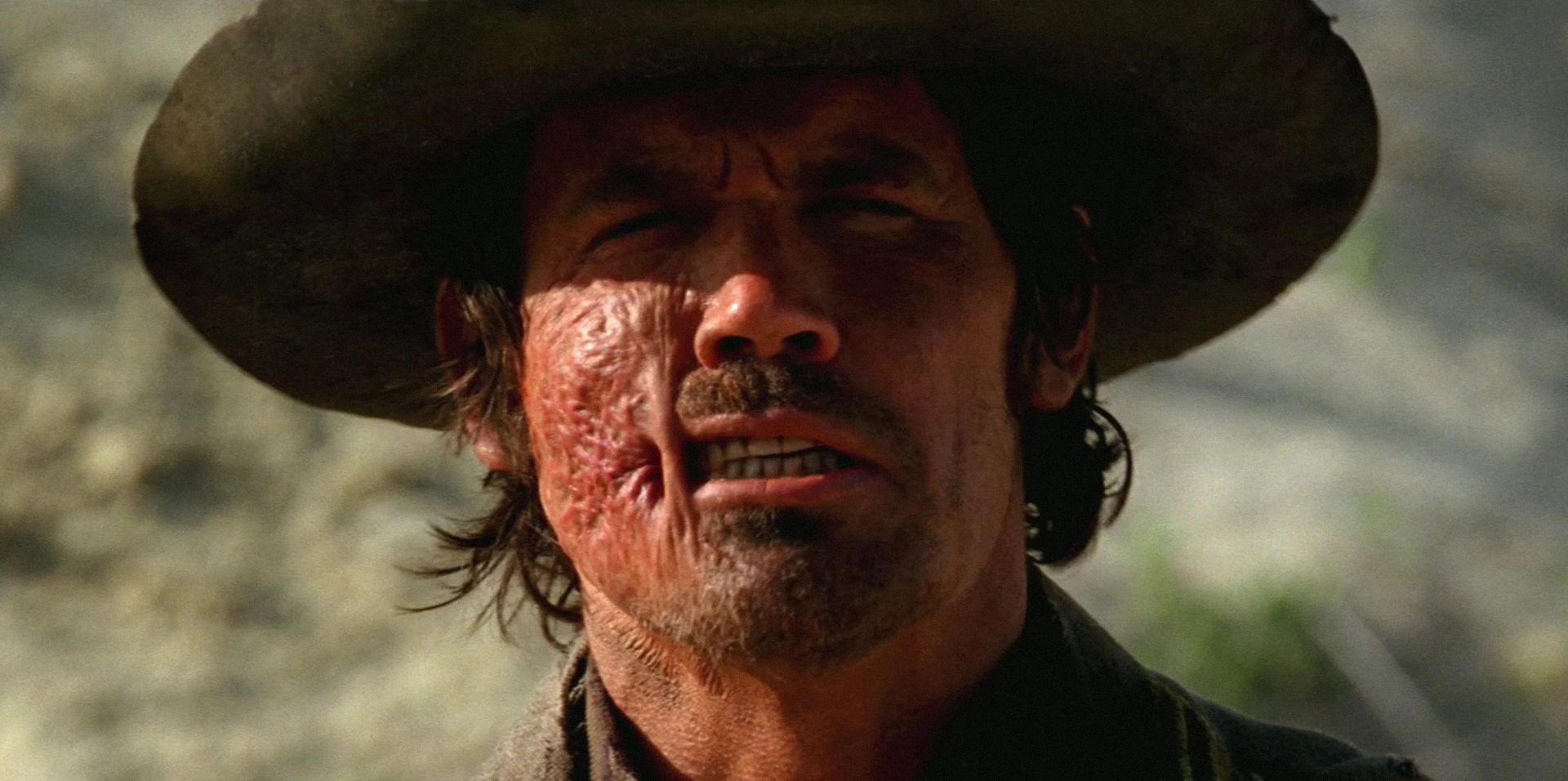
Jonah Hex (Jimmy Hayward, 2010, 82 min.)
“Mark my words, gentlemen. The very fate of our nation may rest with Jonah Hex.” So says President Ulysses S. Grant (Aiden Quinn) to his inner circle of generals. You see, the villainous General Quentin Turnbull (John Malkovich), formerly thought dead, and his merry band of rebels have been staging daring raids on army trains, outposts, and whatnot, stealing what appears to be parts to build a super-Gatling gun that fires possibly radioactive cannonballs. Grant is probably wrong that only Turnbull’s scar-faced nemesis Jonah Hex (Josh Brolin), Turnbull’s former friend who betrayed him at the end of the Civil War, and who can incidentally speak with the dead, can stop the mad general. I mean, he appears to be living under his own name, and he has a large entourage that would be hard to conceal. But as this is a movie called Jonah Hex, we’re going to give President Grant (who’s looking rather young and fit) the benefit of the doubt.
The film is an adaptation of a comic book series that has run intermittently since its creation in 1972, separated by long gaps and huge thematic differences: sometimes he’s your standard Old West antihero; but he went to the future as a sort of Mad Max character in one storyline, and in another he battled zombies and spirits. The film version takes place in that mythos, so all bets are off: history and Hex’s various incarnations are convenient jumping-off points for screenwriters Mark Neveldine and Brian Taylor to concoct a chaotic, darkly funny post-9/11 dystopian tale of conflicting loyalties, old grudges, insane terrorists, and enormous explosions.
Few films were more critically maligned in the summer of 2010. This reception was guaranteed, after the film was delayed for reshoots and rewrites, and star Josh Brolin made public statements about his dissatisfaction with the script. This kind of thing is like a dinner bell for critics, who start to salivate and sharpen their barbed wit when they hear about a troubled production. Audiences stayed away, too, guaranteeing that the film ended up with that Homeric epithet of despair, “critical and financial bomb.” But Jonah Hex doesn’t deserve its reputation. I agree that it’s a narrative mess, that it’s plagued by wildly differing tones, that the talky opening scene and the narration are unnecessary, and that Megan Fox should never be in a movie again. But it’s a wild ride, funnier and more on-the-mark than its detractors give it credit for, and when it works, which it does quite often, it’s one of the better comic book adaptations of recent years.
Brolin has just the right blend of badass seriousness and deadpan delivery to make Hex a believable antihero, driven by things beyond even his own understanding to do the right thing, even if his own definition of “the right thing” might not match everyone else’s. Jonah’s makeup, an old-fashioned prosthetics job, is fantastic. I love how Malkovich, an actor known for being a tad overexpressive, decided to play the villain Turnbull as a dialed-down psychopath, a straight talker whose refusal to shout or gibber insanely makes him even scarier. The score, mostly by metal band Mastodon, is a brilliant blend of dread-inducing apocalyptic noise and country-music twang. And although the backstory is nearly impossible to follow, there’s some magic in the scene where Jonah brings his deceased best friend (and Turnbull’s son) back from the dead, both to try to find out where Turnbull is, and to try to explain, and sort of apologize, for crimes nobody can ever undo.
Former Pixar animator Jimmy Hayward probably can’t be blamed for all of the film’s shortcomings, which appear to be more evidence of post-filming studio tampering than anything. Would this have been a better film if Neveldine & Taylor, the creators of the magnificent Crank, had decided to film it themselves, with a longer running time and the R-rating the material desperately needs (and if Megan Fox weren’t in it)? Of course it would have. But their unique mark is branded on the film, visually and thematically, and along with its other distinctions, is enough to make me respectfully suggest that just about everyone is wrong about this film.

